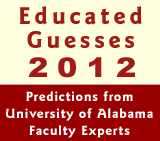 For the 31st consecutive year, The University of Alabama’s Office of Media Relations offers predictions from faculty experts for the coming year.
For the 31st consecutive year, The University of Alabama’s Office of Media Relations offers predictions from faculty experts for the coming year.
Recent events surrounding the Occupy Wall Street movement have led to questions regarding the First Amendment rights of citizens. Dr. Matthew D. Bunker, Reese Phifer Professor of Journalism, says protesters could expect mixed results in litigation.
“Public places such as parks and streets have traditionally been considered public forums for the expression of ideas, but the government retains the ability to impose reasonable restrictions based on the time, place or manner of the speech,” Bunker says. “That means that courts will often side with local officials who try to regulate tents and 24-hour campsites for reasons of public health and safety.”
The U.S. Supreme Court had previously ruled that the First Amendment did not protect protesters sleeping overnight in Lafayette Park in Washington, D.C., but Bunker says some courts have “accepted the argument that ‘tenting and sleeping’ in a public park is a form of symbolic speech and has some degree of First Amendment protection.”
For media members, Bunker says results were likely to be similar but that the courts might see an increase in individual actions for false arrest or excessive force.
“For the media, there seems to be a disturbing trend of rough treatment and arrest for photographers and other media professionals covering Occupy events, even those with bona fide press credentials,” Bunker says. “The press generally has no greater First Amendment rights than the public on government property, so First Amendment challenges to these actions are unlikely to succeed.”